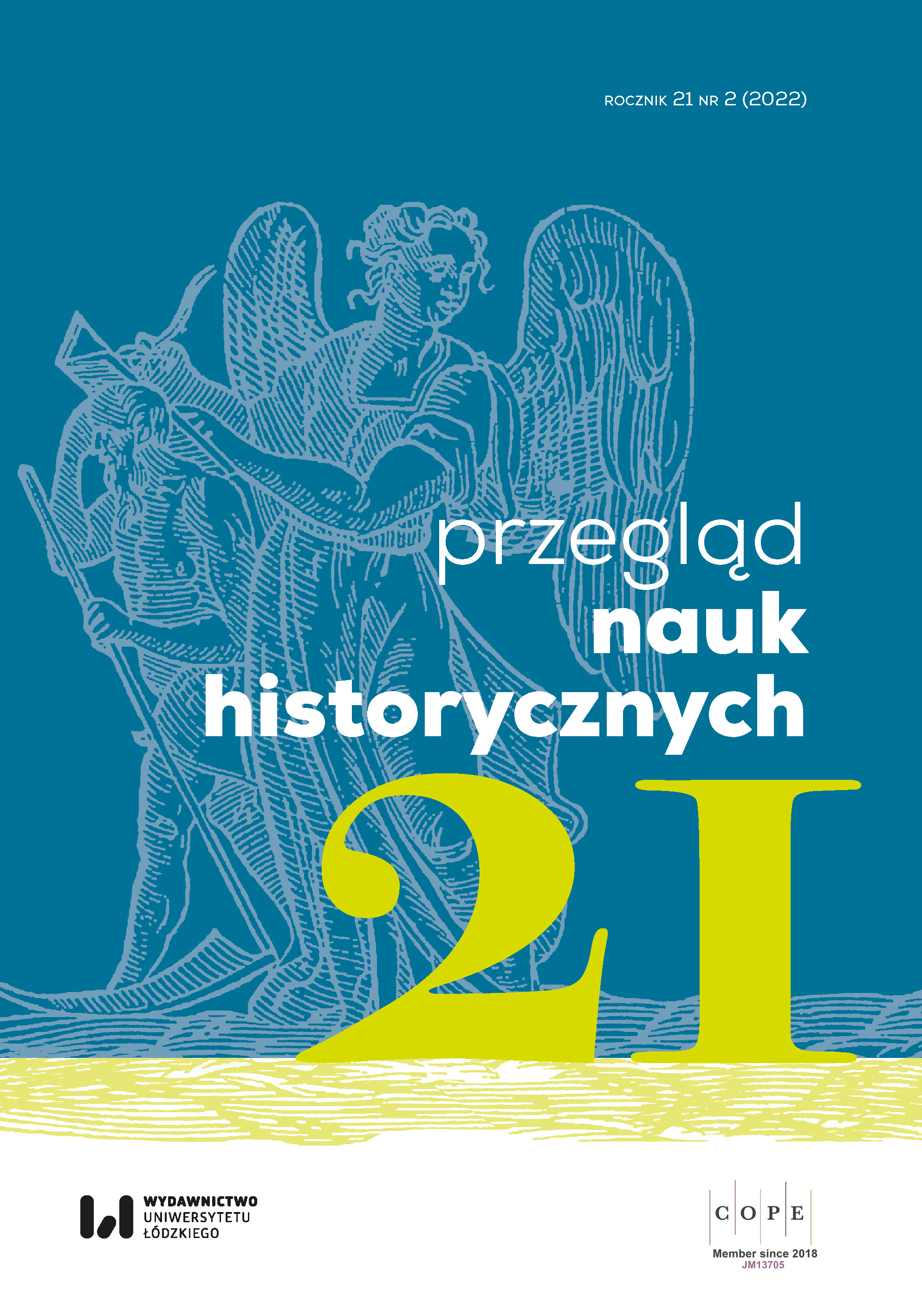Odesa Branch of the Russian Technical Society: the foundation and beginning of practical activity
DOI:
https://doi.org/10.18778/1644-857X.21.02.02Keywords:
scientific and technical societies, engineering community, Odesa Society of Engineers, Technicians and Architects, Odesa branch of the Russian Technical Society, organizational processAbstract
Public scientific and technical societies in the Russian Empire in the second half of the nineteenth century became an iconic phenomenon of socio-economic history, which reflected the important processes of society. Reforms of 1860–1870s gave rise to a public need to unite competent social forces to solve urgent important scientific and technical problems. The purpose of the article is to study the role of the Odesa Society of Engineers and Architects in the industrial development of the Black Sea in the 1860s, and to clarify the process of transforming this organization into the Odesa branch of the Russian Technical Society between 1868–1871. Historical-genetic and historical-systemic methods were used in the study. This issue has hardly been studied by Ukrainian historians. It has been proved that it was in Odesa, long before the founding of the Russian Technical Society, that the first initiatives were announced to unite specialists in technical fields for the collective solution of the problems of the region. The prerequisites for the creation of the Odesa Society of Engineers, Technicians and Architects, and the main directions of its activities have been revealed. The above-mentioned society was an independent organization maintaining this independence during its entire existence. For the first time, the transformation of the society into the Odesa branch of the Russian Technical Society between 1868–1871, and the formation of its organizational structure has been clarified in detail. The chronology of the creation of the Odesa branch of the Russian Technical Society, as well as the role of both central and local authorities in its establishment, have been highlighted. The level of support for public initiatives by central and local authorities has been shown. Attention has been drawn in the article to the leading role in the organization of the Odesa branch of a full member of the Russian Technical Society, Odesa military engineer, Lieutenant Colonel Nikolai Depp. It has been found out that the Odesa Society acted in accordance with the “Instructions for the Odesa Branch of the Russian Technical Society”, that took into account local peculiarities and was approved by the general meeting of the Russian Technical Society in St. Petersburg. The charter of the created society preserved the autonomy of the Odesa branch from the central society. Odesa activists provided only plans of their activities and reports on the results to the St. Petersburg Society. Thanks to the foundation and organization of activity of the Odesa Society of Engineers, Technicians and Architects, which was later transformed into the Odesa branch of the Russian Technical Society, real opportunities for fruitful cooperation and effective work were created for scientists and practitioners.
Downloads
References
Derzhavnyj arhіv Odesskoj oblastі (State Archive of the Odesa Region) [DAOO]: f. 2, in. 1, s. 645a (in Russian)
Google Scholar
Derzhavnyj arhіv Odesskoj oblastі (State Archive of the Odesa Region) [DAOO]: f. 333, in. 1, s. 1, 3, 35–38, 64–65, 67, 78, 132, 309 (in Russian)
Google Scholar
Demchenko T.P., Merezha osvіtnіh zakladіv, utvorenih na Ukrainі vіddіlennyam Rosіjskogo tekhnіchnogo tovaristva, “Іstorychnі doslіdzhennya” 1982, issue 8, pp. 99–107 (in Ukrainian).
Google Scholar
Demuz І.O., Naukovo-tekhnіchnі tovaristva Ukrainy kіncya XIX – pochatku XX st.: іstorіografіya dorevolyucіjnogo perіodu, “Vіsnyk Harkіvskogo nacіonanogo unіversitetu іmenі V.N. Karazіna” 2013, No. 1055, pp. 23–28 (in Ukrainian).
Google Scholar
Filippov N.G., Nauchno-tekhnicheskie obshchestva Rossii (1866–1917), Ucheb. posobie. M.: 1976 [B.i] (in Russian).
Google Scholar
Osnovaniya dlya otkrytiya otdelenij Russkogo tekhnicheskogo obshchestva v gubernіyah, “Zapiski Russkogo tekhnicheskogo obshchestva” 1867, issue 1, pp. 51–53 (in Russian).
Google Scholar
Polnoe sobranie zakonov Rossijskoj imperii, Sobranie vtoroe, vol. XLI, Otdelenie pervoe. SPb., 1868, otd-nie 1, No. 43219 (in Russian).
Google Scholar
Pylypchuk O.O., Іstorіya Kyivskogo vіddіlennya Rosіjskogo tekhnіchnogo tovaristva (1871–1919), Avtoref. dis. na zdobuttya nauk. stupenya k.і.n. K.: 2006.
Google Scholar
Savchuk V.S., K istorii izucheniya deyatelnosti nauchnyh obshchestv Pridneprovya, “Istoriya obshchestvennoj mysli v Rossii i Ukraine. XVII – nachalo XX v.” [Dnepropetrovsk] 1992, pp. 105–111 (in Russian).
Google Scholar
Savchuk V.S., Pervye inzhenernye sobraniya i obshchestva v Rossijskoj imperii, “Voprosy istorii estestvoznaniya i tekhniki” 1992, No. 1, pp. 51–55 (in Russian).
Google Scholar
Savchuk V.S., Kushlakova, N.M., Stvorennya ta pochatok diyal’nosti Katerynoslavs’kogo viddilennya Rosijskogo texnichnogo tovarystva, “Naukovy’j shhorichnyk. Istoriya i kul’tura Prydniprov’ya: nevidomi ta malovidomi storinky” [Dnipropetrovsk] 2009, issue 6, pp. 130–138 (in Ukrainian).
Google Scholar
Downloads
Published
How to Cite
Issue
Section
License

This work is licensed under a Creative Commons Attribution-NonCommercial-NoDerivatives 4.0 International License.













